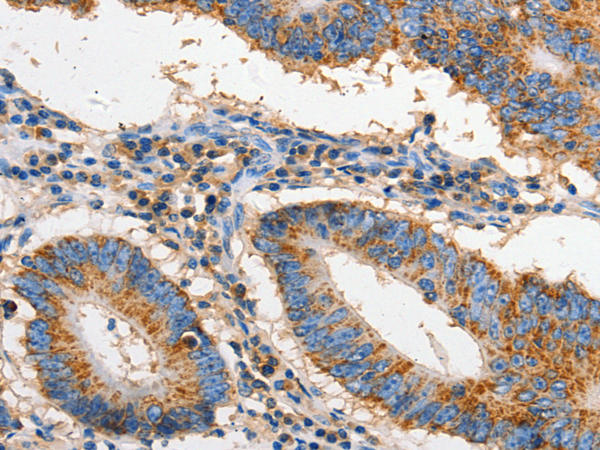

| WB | 咨询技术 | Human,Mouse,Rat |
| IF | 咨询技术 | Human,Mouse,Rat |
| IHC | 1/25-1/100 | Human,Mouse,Rat |
| ICC | 技术咨询 | Human,Mouse,Rat |
| FCM | 咨询技术 | Human,Mouse,Rat |
| Elisa | 1/1000-1/5000 | Human,Mouse,Rat |
| Aliases | APT1; CD95; FAS1; APO-1; FASTM; ALPS1A; TNFRSF6 |
| WB Predicted band size | 38 kDa |
| Host/Isotype | Rabbit IgG |
| Antibody Type | Primary antibody |
| Storage | Store at 4°C short term. Aliquot and store at -20°C long term. Avoid freeze/thaw cycles. |
| Species Reactivity | Human |
| Immunogen | Fusion protein of human FAS |
| Formulation | Purified antibody in PBS with 0.05% sodium azide and 50% glycerol. |
+ +
以下是关于FAS抗体的3篇代表性文献摘要:
1. **"Fas ligand mediates activation-induced cell death in human T lymphocytes"**
*作者:Brunner, T., et al. (1995)*
摘要:该研究揭示了FAS抗体在激活诱导的T细胞凋亡中的关键作用,证明FAS-FASL信号通路是维持免疫稳态的核心机制,并阐明了其在自身免疫疾病中的潜在关联。
2. **"Monoclonal antibody-mediated tumor regression by induction of apoptosis"**
*作者:Trauth, B.C., et al. (1989)*
摘要:首次报道针对FAS受体的单克隆抗体可通过直接激活凋亡信号通路,在体内外诱导肿瘤细胞死亡,为FAS抗体在癌症治疗中的应用提供了实验依据。
3. **"The role of Fas in autoimmune diabetes"**
*作者:Chervonsky, A.V., et al. (1997)*
摘要:通过小鼠模型证明FAS抗体异常表达会导致胰岛β细胞凋亡失控,揭示了FAS信号缺陷与1型糖尿病发病机制的分子关联,为自身免疫疾病的治疗提供了新靶点。
(文献选取涵盖基础机制、肿瘤治疗和自身免疫疾病三个研究方向,时间跨度反映关键研究成果)
FAS antibodies are associated with the FAS protein (also known as CD95 or APO-1), a cell surface receptor belonging to the tumor necrosis factor (TNF) receptor superfamily. FAS plays a critical role in apoptosis, a programmed cell death process essential for immune regulation, tissue homeostasis, and elimination of damaged cells. Upon binding to its ligand (FASL), FAS triggers caspase-dependent apoptosis, particularly in activated lymphocytes, to maintain immune tolerance and prevent autoimmunity.
FAS antibodies can refer to either autoantibodies targeting FAS or laboratory-generated antibodies used in research. Autoantibodies against FAS have been implicated in certain autoimmune disorders, such as systemic lupus erythematosus (SLE) and autoimmune lymphoproliferative syndrome (ALPS), where disrupted apoptosis leads to lymphoproliferation and autoimmune manifestations. In ALPS, FAS gene mutations impair receptor function, but autoantibodies may exacerbate the disease by blocking FAS-FASL interactions.
In research, FAS antibodies are tools to study apoptosis mechanisms, protein expression, and signaling pathways. They are widely used in techniques like flow cytometry, immunohistochemistry, and Western blotting. Dysregulation of the FAS-FASL pathway is also linked to cancer immune evasion, neurodegenerative diseases, and viral infections, making FAS antibodies valuable in both diagnostic and therapeutic research. Understanding FAS antibody interactions provides insights into cell death regulation and potential treatments for apoptosis-related disorders.
×